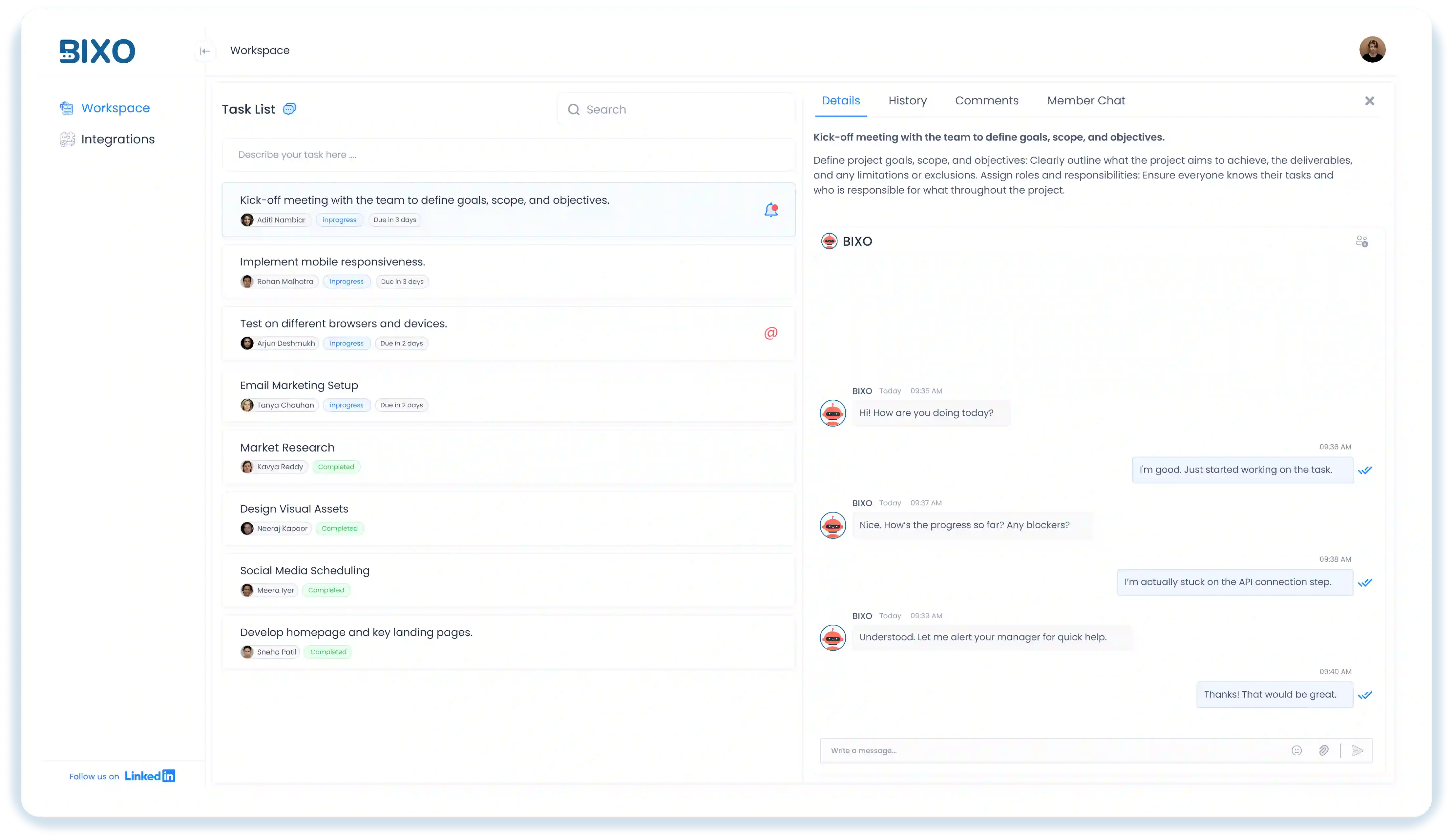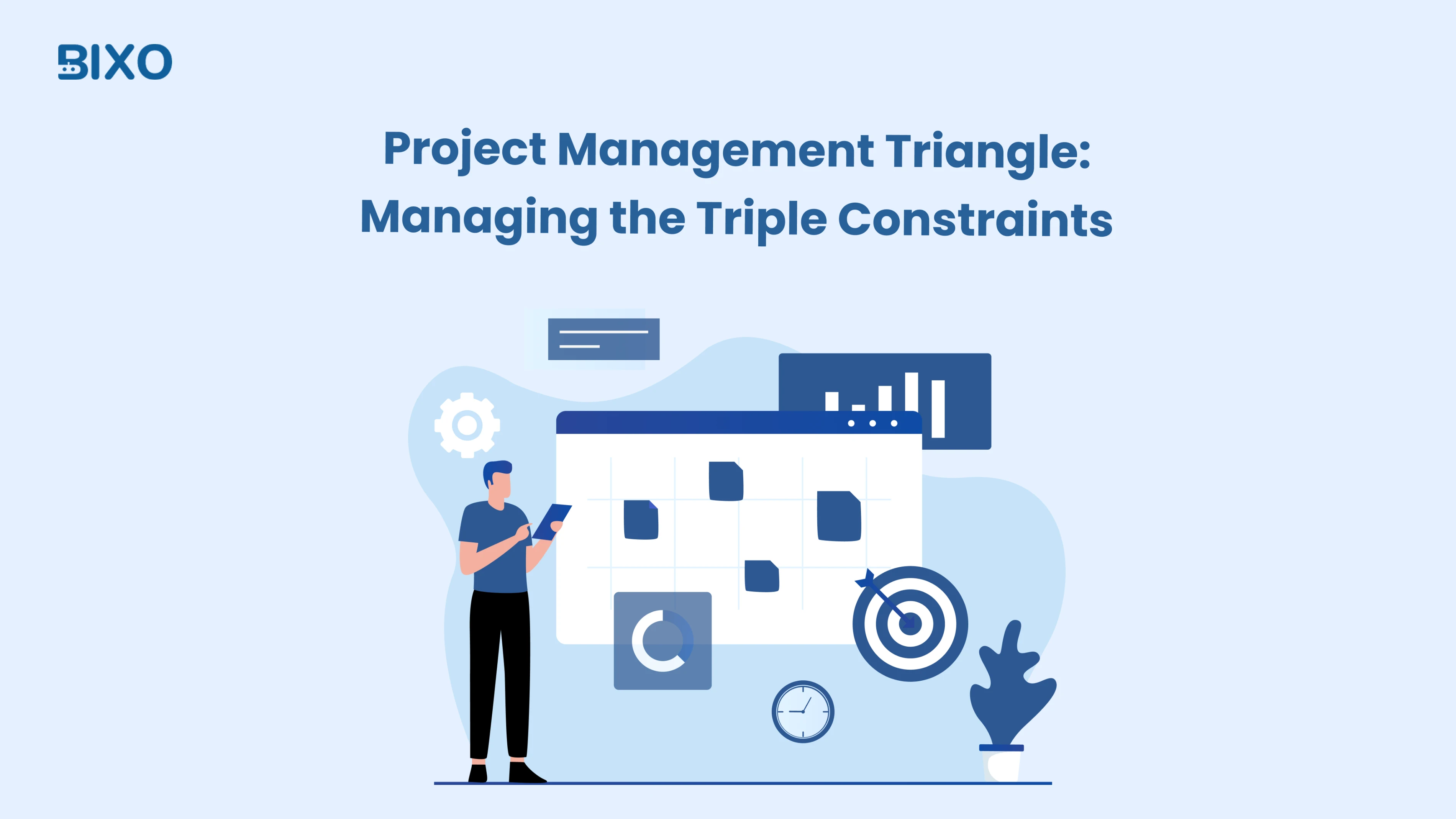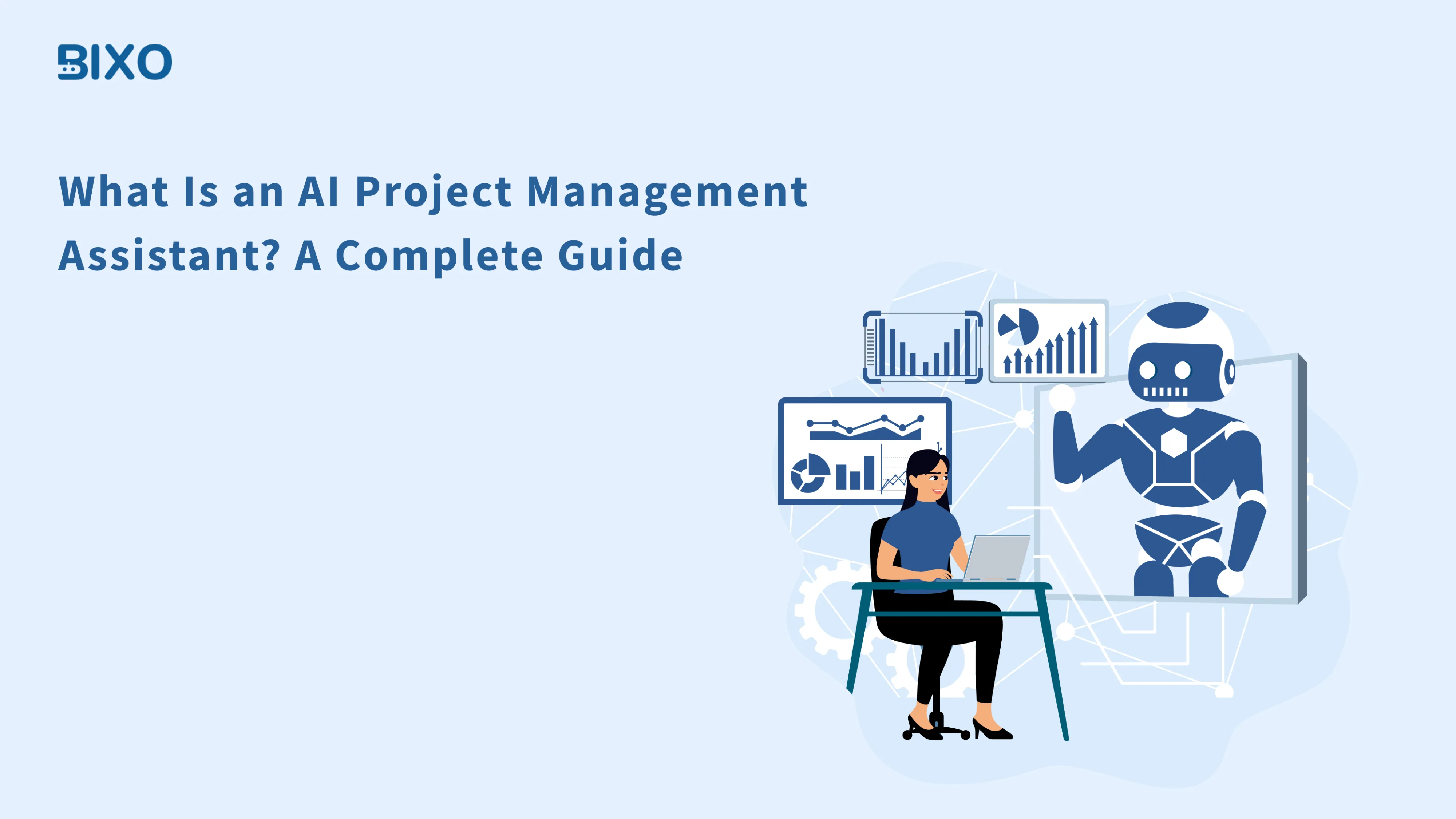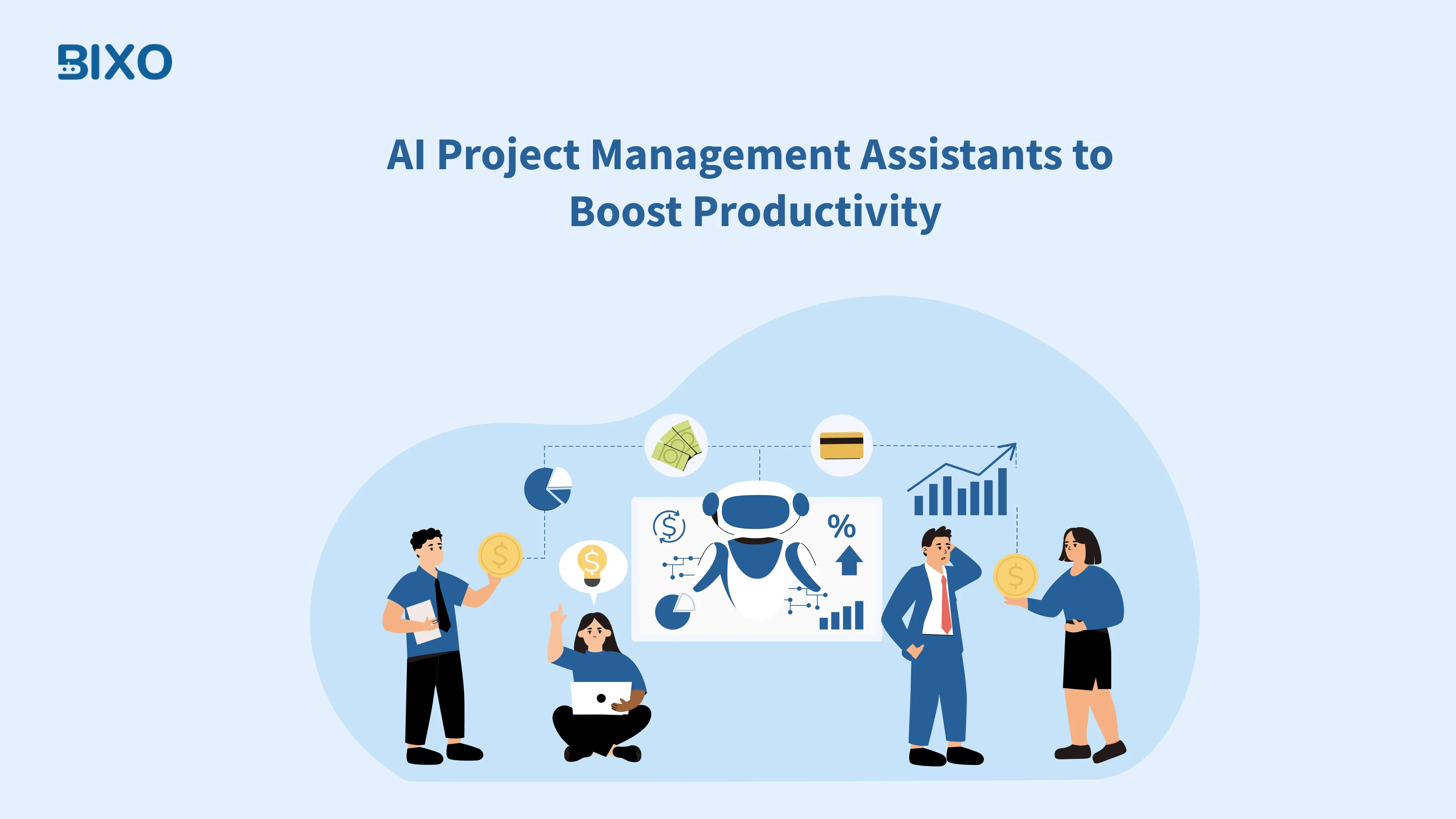
Table of Content
Focus on what matters. BIXO handles the rest!

Are you struggling to keep your projects on track? Choosing the right project management methodologies can make all the difference. The right approach helps you plan better, manage your team smoothly, and deliver results on time.
In this blog, you will learn about different project management methodologies and how to pick the one that fits your project. We will also share practical tips to make your project management more effective.
What Is Project Management Methodology?
Project management methodology is a way that guides you on how to manage a project from start to end. The project methodologies ensure that every step is planned, monitored, and maintained in control, which helps you run a project plan step by step, helping teams to finish projects faster with better results.
There are various work methodologies, each with its own detailed rules and processes. Some follow a fixed order of steps, while others allow flexibility and change during the team development process. Selecting the right method for your team depends on the type of project, team structure, and project goals you are working on.
Top 10 Types of Project Management Methodologies
Choosing the right project management methodology helps you organise work, manage teams efficiently, and deliver successful outcomes. Here are the top 10 methodologies you can use to plan, execute, and complete projects effectively.

Waterfall
Waterfall methodology is a step-by-step process to manage projects. Projects are divided into 5 stages like planning, design, building, testing, and delivery. It focuses on careful planning and clear documentation from the start, which makes it a good choice for projects that have fixed and clear business requirements.
It is easy to monitor the progress and identify problems early because each step has to be completed before another can be started. This method gives teams more control and predictability, but it's harder to make changes once things are in process. This is the reason why it is suitable for a project whose plan is not supposed to alter significantly.
Agile
Agile methodology is an approach used to carry out projects by breaking workloads into smaller pieces called sprints. Each sprint includes planning, doing the work, and reviewing it. By organising work in this way, Agile allows teams to be flexible and adjust to work quickly based on needs and feedback.
Agile principles focuses on teamwork, regular updates, and making changes without restarting the project. Instead of planning the entire project at the start of the month, it allows time for progress at each step. Agile is often suited to projects where things change frequently or need continuous improvements. It keeps customers involved, encourages fast delivery, and helps teams improve as they go.
Scrum
Scrum is one of the leading project management methodologies, assisting teams to work quickly and adapt to change effectively. It follows a clear structure with specific roles like Scrum Master and Product Owner, allowing teams to work together with clear focus and organisation.
Teams hold short daily meetings to check progress and solve problems early. This work methodology encourages regular feedback and helps teams deliver better results faster. Scrum is best for projects where the requirements can change or increase with time.
Kanban
Kanban, a visual method of project management, shows tasks on a board as they go through stages like "To Do", "In Progress", and "Done". This allows teams to easily visualise progress, and it encourages more efficient ways of working by limiting the amount of work "in progress" within each stage of the workflow. Kanban is a pull system where teams only take on new work when they have the time, which prevents overload.
Kanban is an excellent approach for teams that want some flexibility, increased focus, or just a better view of how work is being done. It can work reasonably well with less complex projects. However, if there are too many stages involved, it may not suit the project.
Lean
Lean project management methodology that helps teams do more by reducing waste,
improving Lean was originally developed for the manufacturing sector, and now it is used for all types of project management. It minimises overwork, delays and removes any steps that do not add value. Lean is a flexible approach that serves teams who want to improve performance work, reduce costs and keep
things running smoothly. It fits well with other modern project management
techniques and supports continuous improvement over time. The Critical Path Method is a way of managing a project that is used in
project planning and
project scheduling the important tasks. It helps teams by showing the
duration of the project. This approach is most suitable for
complicated projects with multiple steps and strict deadlines. Using CPM, you can track all the major tasks, like expected duration for the task, and the need for the tasks. This type of project management framework is great for teams that need well-coordinated procedures, task sequencing, and clear
instructions for delays. It is probably one of the most used project management
techniques in large projects that do not allow any delay. Critical Chain Project Management (CCPM) is a project management methodology that focuses on managing resources (teams, equipment, time) instead of tasks. The goal of CCPM is to keep resources flexible and reduce delays. CCPM was founded by Eliyahu M. Goldratt in 1997, and he mentioned this in his book Critical Chain. CCPM is observed to complete projects 10–50% faster! CCPM is a
flexible way of managing projects that works well in small or
large organisations, especially in construction, software, and tech R&D. Six Sigma refers to a famous project management philosophy that helps in enhancing the quality of work, which involves the identification and correction of problems in a process. Invented at Motorola in the 1980s, this work philosophy is based on data and statistics to minimise errors and improve results. It is trained by professionals known
as Green belts and Black belts, and that follows a proper
process which is called DMAIC (Define, Measure, Analyse, Improve, Control). Six Sigma is suitable for larger businesses with complicated projects that want to
reach better performance over time. Sigma is well-known for
helping teams achieve consistent, high-quality results in many industries. Hybrid methodology helps project management by combining the strengths of different project management frameworks. It takes the structure and clarity within traditional approaches (like Waterfall) and adds the flexibility
and speed of the agile development methodology. This helps teams plan better,
respond to change faster, and deliver results quickly. It supports both detailed documentation and ongoing collaboration, making it ideal for projects that need both stability and
adaptability. Hybrid approaches also improve team coordination
and allow better handling of changing client or market needs. Extreme Programming (XP) is used mainly in software projects. XP follows five key values: simplicity, communication,
feedback, respect, and courage. This working style promotes successful
team communication, and continuous
feedback and also motivates developers, managers, and customers
to perform a task that leads to improved performance. It is one of the project management methodologies best suited for small, co-located teams that want fast updates and ongoing improvements.
As part of modern project management frameworks, XP assists
teams in being focused, adaptable, and responsive to changes.Critical Path Method (CPM)
Critical Chain Project Management (CCPM)
Six Sigma
Hybrid Methodology
Extreme Programming (XP)
How to Choose the Right Project Management Methodology
Selecting the right project management method provides better control, clear communication, and successful delivery throughout the project. The following key factors help you make the right decision in choosing the right methodology for your project needs.

Project Type & Complexity
Understand your project scope and complexity before choosing a method. Complex projects often need detailed quality management and clear tracking. Easy projects may work better with simpler methods. Apply a simple and easy approach to easy projects and a complex one to complex projects.
Team Size & Structure
Small teams can use agile and Kanban methodologies. Larger teams may need project management methodologies with more detail to ensure teams are coordinated and resources are used more effectively.
Client or Stakeholder Involvement
When clients or stakeholders need frequent input, choose a method that encourages regular collaboration. This is achieved through good project management tools, clear communication to ensure that everyone is on the same track and is involved at every step.
Timeline & Deadlines
Short project durations require a flexible and responsive approach. When deadlines are strict, the method should help the team to manage time efficiently and adjust to changes as they come. This is where adaptive project framework thinking can be useful.
Budget Constraints
Look at how much budget is available. There are methods which reduce waste, such as lean project management, but some of them may need more resources. So, always balance cost with control and effectiveness.
Tool Support & Experience
Make sure your team understands the project management tools that will be used. If your team has experience with past systems such as Scrum and Kanban, it is beneficial to choose a system that works with those. A project management professional may help you choose the best project management tool.
How BIXO Supports Project Management Methodologies in Action

Choosing the right project management methodology is only the first step. The real challenge is putting it into action effectively. This is where BIXO is helpful. BIXO helps you organise tasks, set deadlines, and track progress in real time. Whether you are using Agile, Waterfall, or any other methodology, BIXO keeps your team aligned and ensures nothing falls through the cracks. It also simplifies collaboration, allowing team members to communicate and share updates effortlessly.
With BIXO , you can apply your chosen methodology with confidence, making project management smoother, more transparent, and more efficient.
Conclusion
Choosing the right project management methodology can transform the way you plan, organise, and execute your projects. Each methodology has its strengths, and the key is to find the one that fits your team, project type, and goals. By understanding the options and applying them effectively, especially with the help of tools like BIXO, AI manager assistant you can improve efficiency, collaboration, and the chances of project success. Remember, the right methodology paired with the right tools makes project management simpler and more effective.
FAQs
The Agile framework assists a team in monitoring project progress through short sprints, fast feedback and continuous improvements.
Traditional project management follows a sequential process and has fixed phases and less flexibility. Modern practices such as Agile are flexible and focus on collaboration.
Common project management methodologies such as Agile, Waterfall, and PRINCE2 provide different ways to plan and manage work. They help teams monitor the management process clearly by setting goals, timelines, and responsibilities.
You can choose the best project management methodology by considering your project size, goals, timeline, and team structure. Agile works well for flexible, fast-moving projects, while Waterfall suits structured, sequential tasks.
Get a demo of BIXO
Recommended Blogs

Project Management Triangle: Managing the Triple Constraints
Master the project management triangle by balancing scope, cost, and time with simple strategies that drive successful outcomes every time.
 Jahnavi Chintakrindhi |
Jahnavi Chintakrindhi |
 Oct 13, 2025
Oct 13, 2025

What Is an AI Project Management Assistant? A Complete Guide
Learn how an AI Project Management Assistant helps you organise tasks, automate updates, save time, and improve project results with less effort.
 vishnu-priya |
vishnu-priya |
 Oct 24, 2025
Oct 24, 2025

Top 7 AI Project Management Assistants to Boost Productivity
Explore the top 7 AI Project Management Assistants in 2025 and learn how to choose the right one to boost productivity, streamline work, and scale teams.
 Tarun Kumar Reddy Atmakuru |
Tarun Kumar Reddy Atmakuru |
 Oct 17, 2025
Oct 17, 2025
